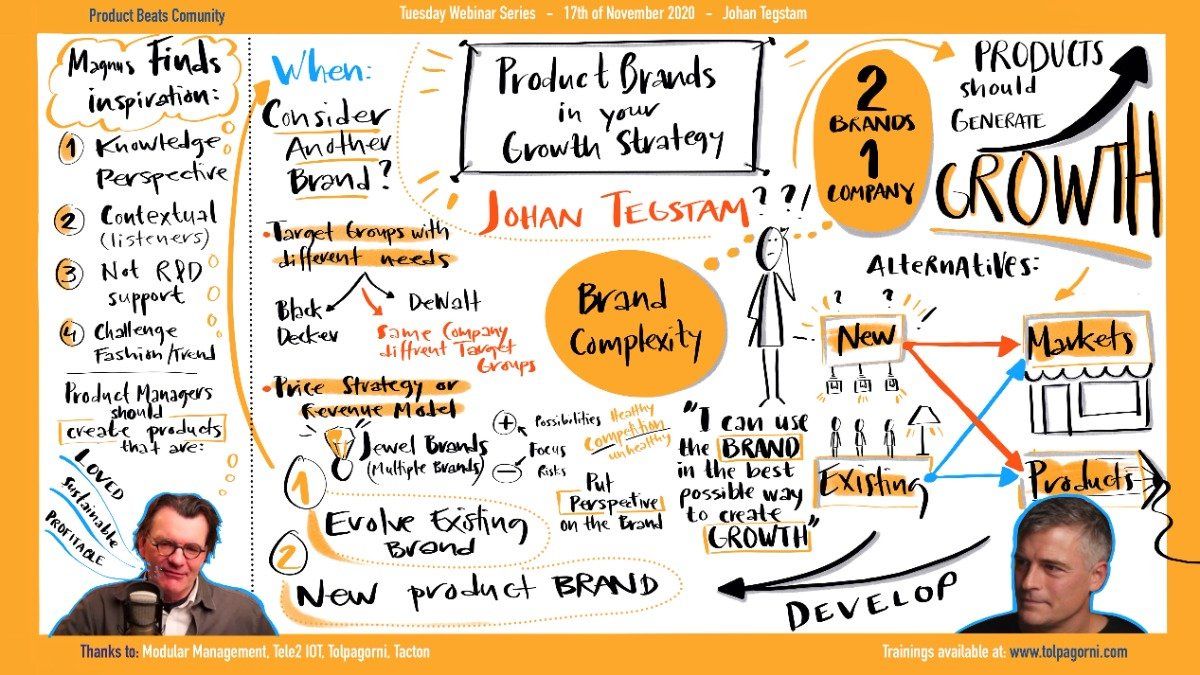Episode 34: Brands for Growth w/Johan Tegstam
23 November, 2020 / Host: Magnus Billgren
How Product Managers Can Use Product Brands to Achieve Growth
Product management is a fascinating area that allows individuals to make their mark in the competitive business world. Johan Tegstam, a product manager who has worked with several brands over the years, recently shared his insights on how product brands impact growth strategies. In this episode of the Productbeats Show, he talked about his experiences, including how he learned to leverage brand positioning and product differentiation to achieve growth. This article examines the highlights of Johan Tegstam's views on brands and their importance in growth strategies.
Importance of Brand in Growth Strategies
For many years, Johan worked as a product manager and focused mainly on developing products for growth. He initially did not consider product brands as part of his growth strategy. However, this changed when his company embarked on an ambitious M&A strategy and acquired several brands. Johan found himself having to consider the different brands in his growth strategy, which he initially found complex. However, he realized that the different brands presented new possibilities for growth, and he began to leverage them to achieve his growth goals.
According to Johan, the product brand is a critical aspect of growth strategy. He believes that leveraging the brand positioning and differentiation is key to achieving growth in any product category. Johan highlights the importance of considering the different brands available and how they can be used to differentiate products and increase sales. He notes that it is essential to consider which brand to use when developing a new product, especially if the company has several brands to choose from.
Leveraging Brand Positioning and Product Differentiation
Johan emphasizes that product managers should leverage the brands' positioning and differentiation to achieve growth. He notes that it is vital to differentiate products to increase sales and market share. Differentiating products helps to ensure that they stand out from the competition and are recognized by consumers. Johan believes that the brand is the foundation for differentiation, and product managers should use it to differentiate their products.
According to Johan, product managers can differentiate their products by leveraging the brand's unique selling proposition (USP). The USP is the distinctive benefit that the product offers compared to the competition. Johan notes that the USP should be the foundation of the product's marketing strategy, and it should be used to differentiate the product from others in the market.
Another way to differentiate products is by diversifying them. Johan suggests using different brands to diversify products and differentiate them from others in the market. Using multiple brands can help to increase sales and market share by offering customers more options to choose from. Diversifying products can also help to attract new customers and retain existing ones.
Considering Market Segments and Geographies
Johan notes that product managers should consider the different market segments and geographies when developing products. He suggests developing products that cater to the needs of the different market segments and geographies. For example, when developing a product for a specific market, the product manager should consider using a brand that is recognized in that market to increase product adoption.
Johan highlights the importance of considering the existing brand when developing products for new segments and geographies. He notes that using the existing brand can help to reduce the cost of developing new brands and increase product adoption. Johan also notes that it is essential to consider the brand's evolution when developing products. The brand should evolve to reflect changes in the market and consumer preferences.
Brand Guides and Communication
Johan notes that product managers should create brand guides to ensure that the products communicate the brand effectively. The brand guide should outline the brand's visual identity and tone of voice.
However, brand guides are not set in stone. They should evolve with the brand and its products. As product managers, we should keep a close eye on our brand's positioning and ensure that our products communicate the brand's evolving message. This is crucial because a brand that fails to adapt to changing market trends and consumer preferences risks becoming irrelevant.
Furthermore, effective communication of the brand's message is vital for driving growth. A well-communicated brand message can increase product possibilities and deepen product adoption. Product managers should work closely with the marketing and communication teams to ensure that the product's message aligns with the brand's messaging and tone.
Takeaways
- Brands are an essential aspect of product growth strategy, and product managers should consider the potential of existing and acquired brands to increase product adoption and diversify offerings.
- Product managers play a significant role in building and maintaining product brands, and they should work closely with brand guides to ensure that products communicate the brand effectively.
- When considering growth strategies, the product development strategy in the Ansoff matrix should be a primary focus for product managers, who can leverage existing product brands to access new markets or launch new products.
As we've seen, effective product management involves not only developing and launching new products but also strategically leveraging your brand to achieve growth in existing and new markets. This requires a deep understanding of your market, your customers, and your brand's positioning.
If you're interested in taking your product management skills to the next level and gaining a comprehensive understanding of the discipline, consider enrolling in The Productbeats Product Management Certification Program. This program provides a structured curriculum covering all aspects of product management, from market research and product development to branding and growth strategy. By earning this certification, you'll be equipped with the knowledge and skills to lead successful product launches and drive growth for your company.
You might also enjoy watching...
Copyright © 2023 ProductBeats AB

Get The Program Brochure
Submit the form below to have The Program Brochure delivered to your inbox
The title of the notification
The descriptive text of the notification


